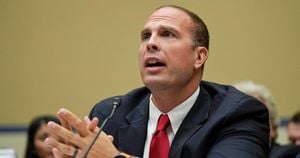Ruben Gallego has made history as Arizona's first Latino senator after winning against Kari Lake, former news anchor and staunch supporter of Donald Trump, in the recent U.S. Senate race. The Associated Press confirmed Gallego's victory, which demonstrates not just personal achievement but also reflects broader political dynamics within Arizona, known for its complex and shifting electorate.
With around 95% of votes counted on the night of November 11, Gallego had secured 50% of the vote compared to Lake's 47.8%, leading by approximately 2.2 percentage points. His win was celebrated as a significant turnaround for Democrats, especially after the contentious gubernatorial race where Lake had previously challenged the election results. Gallego proclaimed, "Gracias, Arizona!" on social media, expressing heartfelt gratitude for the support he received.
Gallego's political rise is notable; he has represented Arizona's 3rd Congressional District since 2015 and became well-known for his progressive stances on various issues, including immigration, healthcare, and the economy. His campaign focused on making life more affordable for average Arizonans and stood firmly on the issues of abortion rights—especially pertinent following recent judicial challenges to reproductive rights.
Throughout the campaign, Lake found herself entrenched with the beliefs surrounding the 2020 election fraud claims, continuing her narrative of election denialism, which derogatorily branded her as “unreformed fanatic” by critics. Lake had previously lost to Democrat Katie Hobbs in the 2022 gubernatorial race, and her failure to concede or accept the legitimacy of those results had persisted as part of her political identity. This time around, her defeat led her followers to spread unverified rumors of impropriety, echoing the false claims of election fraud she championed earlier.
Gallego's strategy was fortified by his ability to engage independent and moderate voters, which became pivotal for his success. His campaign message evolved to address the state's concerns over immigration reform, housing affordability, and public safety—issues particularly significant to Arizona's diverse population. Unlike Lake, whose hardline positions seemed to alienate moderate Republicans, Gallego showcased his military background as a U.S. Marine veteran and focused on relatability and inclusivity, stating, "I will fight for Arizona in Washington" amid cheers from his supporters.
The election outcome was also significantly influenced by Gallego's progressive stance on issues such as climate change and veterans’ affairs, cementing his image as not just the Democratic candidate, but as one actively advocating for changes residents genuinely wanted to see. His support for improving border security reflected the wider sentiments of voters who felt the need for enhanced safety without compromising immigration rights.
The dynamics of the race can be traced back to the larger political climate of Arizona, historically viewed as a Republican stronghold yet gradually transforming. Recent elections, particularly during high-profile races such as vice president’s with Kamala Harris and various Senate races, indicated this transformation. Voters began leaning toward Democratic candidates, guided by concerns over personal freedoms, government accountability, and the fluctuated economic stability.
Significant to Gallego's campaign was the departure of Kyrsten Sinema from the Democratic party as she opted to run as an independent. Her choice to step away from partisan politics opened the field for Gallego to attract the progressives unfulfilled by Sinema’s pivot, allowing him to position himself clearly aligned with the traditional Democratic values and aspirations of the people.
His grassroot efforts also included cultural connections; he capitalized on his heritage, linking his campaign to festivities showcasing Latino culture, appealing strongly to Hispanic voters. This strategy clearly showed results, as voters identified with his story of overcoming struggles as the child of Colombian immigrants.
Lake’s hard-right positioning, including her narrative around Trump and resistance to acknowledging the legitimacy of the 2022 election affected her campaign adversely. Despite Trump's continued alignment with Republican candidates, Arizonans rejected Lake, marking another setback for candidates who cling to divisive party lines.
After intense rounds of voting, Arizona finally tabulated over 3.2 million ballots, signifying both voter engagement and trust amid the drawn-out process. Social media and campaign strategies were underscored by gerneral public enthusiasm for the fresh energy Gallego represented; he ran on promises of reforming the broken immigration system and generating economic relief for struggling families.
Lake's campaign, characterized by strident rhetoric and staunch adherence to Trump loyalist policies, alienated many voters and proved inadequate against Gallego's more nuanced approach. His ability to connect with the populace over real-life concerns was instrumental, particularly his outreach efforts to understand common struggles related to housing costs and personal well-being.
The question of whether Lake, having already begun her political career on the foundation of contesting election results, would concede was positively addressed by Gallego, who assured all Arizonans, including those who didn’t support him, of his commitment to represent their interests. Meanwhile, Arizonan voters continue to navigate through the intricacies of political affiliations, as they switch allegiance between candidates based on their resonance with individual issues over party loyalty.
Following his decisive victory, Gallego emphasized the immediate need for reforming flawed policies, stating his focus would be on the economy and immigration reforms reflective of the people’s voices. He recognized the broader coalition needed to drive legislative changes, refreshing the political atmosphere within Arizona, and preparing to take his place among the country’s key political figures.
Overall, the results of the Arizona Senate race were indicative of shifting electoral trends—where personal narratives, background connections, and the willingness to listen and adapt messaging to meet constituents’ needs play distinct roles. The voters of Arizona demonstrated through their choices a clear preference for representation grounded within accountability, community engagement, and resolution.



